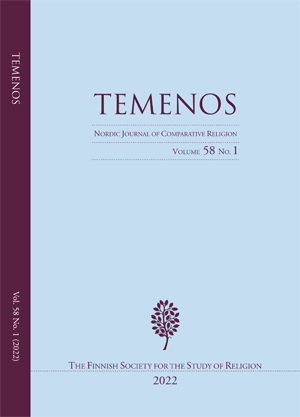God Making in China
Notes Toward a Theory of Deification
DOI:
https://doi.org/10.33356/temenos.97064Keywords:
Deification, Divinization, China, Frederick Lenz, Li Hongzhi, li hongzhi, new religions, Falun Gong, apotheosisAbstract
Some religious leaders tend to gravitate towards claims of increasingly greater holiness. This sometimes results in the assumption of explicitly prophetic roles or in more extreme cases, claims of divinity. The present paper discusses the apotheosis of Li Hongzhi, the founder of Falun Gong. Although a comprehensive theory of divinization remains elusive, some general points can be made. First, we argue that any effort to theorize deification must include the observation that it is a process that arises in the context of social interaction between leader and followers rather than exclusively within the psyche of the leader, a point which has sometimes been missed in previous analyses. Second, divinization is a gradual process, with claims of divinity typically being amplified over time. Third, one must consider that divinization typically takes place within social spaces more or less set apart from the larger society, with group dynamics that facilitate deification. Fourth, divinization can be a strategy for coping with external threats like critical outsiders and repression. Finally, we argue that any effort to understand deification needs to consider the wider cultural and religious context. ‘God’ is a polythetic term, and divinization may therefore take on many different forms.

Downloads
Published
How to Cite
Issue
Section
License
Copyright (c) 2022 James R. Lewis, Magrethe Løøv

This work is licensed under a Creative Commons Attribution 4.0 International License.
Author's Guarantee
- The Author acknowledges that the Work will be publicly accessible on the Internet and that such access will be free of charge for the readers.
- The Author guarantees that the Work is her/his original work that has not been published before and cannot be construed as copying or plagiarism. Furthermore, the Author confirms that the Work contains no statement that is unlawful, defamatory or abusive or in any way infringes the rights of others.
- The Author confirms that she/he has secured all written permissions needed for the reproduction in the Publication of any material created by a third party.
User Rights
Under the CC BY 4.0 license, the Author/s and users are free to:
- Share — copy and redistribute the material in any medium or format,
- Adapt — remix, transform, and build upon the material for any purpose, even commercially,
- However, the Work must be attributed to the original Author and source of publication.
The license of the published metadata is Creative Commons CCO 1.0 Universal (CC0 1.0)
Author Rights
The Authors maintain the right to:
- copyright, and other proprietary rights relating to the Work,
- the right to use the substance of the Work in future own works,
- the right to self-archiving/parallel publishing (publisher's PDF allowed).
Rights of Publisher
- The Publisher reserves the right to make such editorial changes as may be necessary to make the Work suitable for publication in the publication, e.g. style of punctuation, spelling, headings and the like.
- The Publisher will publish the Work if the editorial process is successfully completed and reserves the right not to proceed with publication for whatever reason.
- The publication entitles the author to no royalties or other fees. This agreement will be governed by the laws of Finland.






